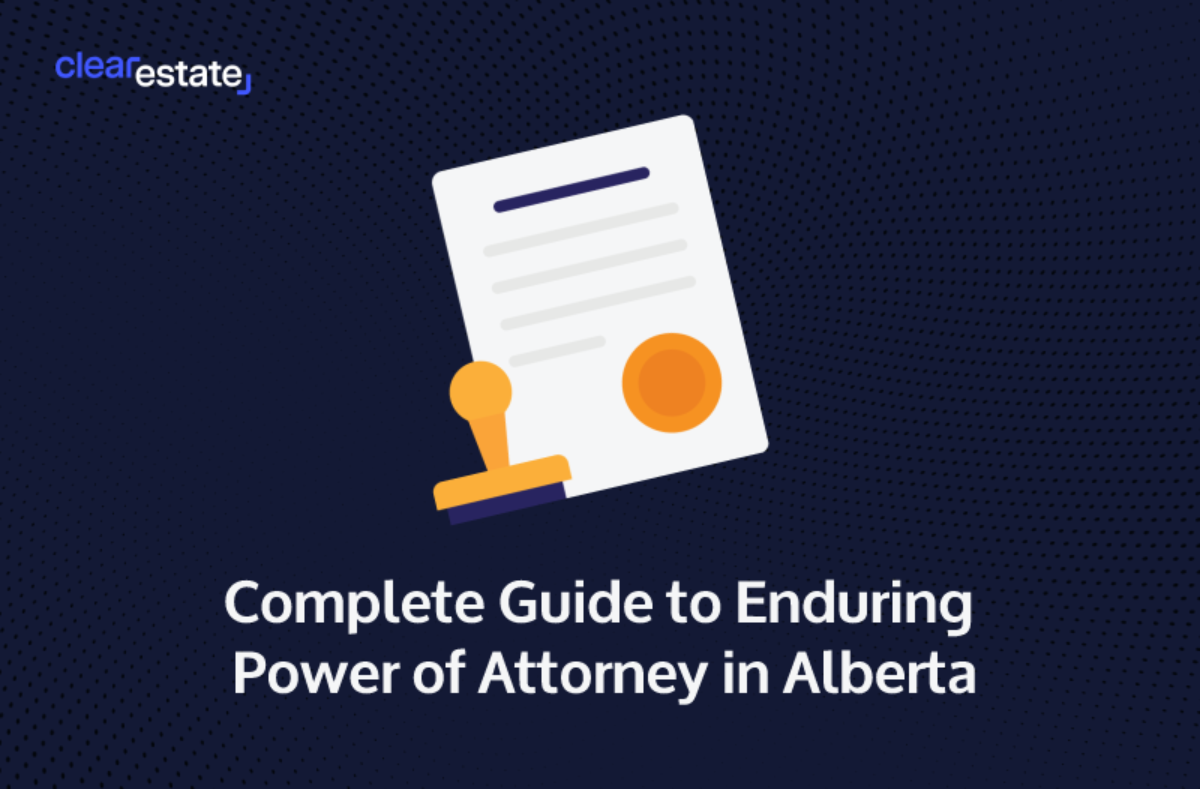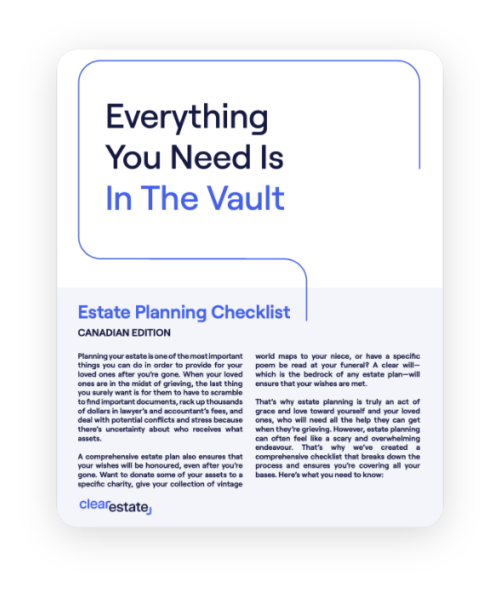Estate Planning
Oct 27, 2025
Introducing Empathy to Estate Bureaucracy
ClearEstate’s origin story: how grief, inefficiency, and compassion inspired Alex to build a fintech that brings empathy and efficiency to estate planning and settlement
Explore the key aspects of Alberta's Enduring Power of Attorney. Learn about its significance, legal requirements, and implementation in this detailed guide.


In Alberta, an Enduring Power of Attorney, or EPOA, is a legal document defined under the Powers of Attorney Act. It allows the individual for whom the document is for, known as the “donor,” to appoint another individual, known as the “attorney,” to manage their financial affairs and act fully on their behalf.
The attorney must respect the specified guidelines of when the document comes into effect, and what responsibilities the appointed attorney is required to fulfill. A document is only an Enduring Power of Attorney if stated in the document.
As opposed to a standard power of attorney, which ends if the donor can no longer maintain their mental capacity, an enduring power of attorney allows the appointed attorney to continue to manage the donor’s affairs even if the donor has lost mental capacity.
This means that if an individual becomes unable to make important financial decisions, whether due to medical or mental incapacity, the EPOA allows the attorney to take over the management of these affairs.
This assures that all financial matters, whether real estate, investments, or other resources, are properly managed by someone the donor trusts with this responsibility, who is able to make any necessary financial decisions.
An arrangement such as this guarantees financial stability, especially in situations of uncertain health, and the peace of mind of knowing that all matters will be handled should any unexpected situations occur.
Creating an enduring power of attorney in Alberta means that both the document and the individual appointed to act in this role must meet specific requirements, to maintain the validity and thus effectiveness of the document.
To create a valid EPOA, it must meet the following criteria set by Alberta’s surrogate court:
Additionally, the document comes into effect either once it is signed, on a specific date, or when a specific event occurs, such as when mental capacity is lost, depending on what is specified in the document.
An enduring power of attorney may not be valid outside of Alberta, so it’s advised to consult with a professional to ensure that the document meets all the requirements you need it to.
While Alberta does not currently have a formal Enduring Power Of Attorney form, it is recommended to consult an estate planning professional to ensure the validity and legality of your EPOA.
In addition to the requirements for the document itself to be considered valid, the individual acting as the appointed attorney must also meet the following criteria:
By following these steps, you can assure that your EPOA document is legally sound, and reflects the intentions for how all aspects of your financial affairs should be managed.
The purpose of an enduring power of attorney is to allow the appointed attorney the ability to act on behalf of the donor for certain financial matters. Once an enduring power of attorney is established, the possible responsibilities of the appointed attorney can include:
Ultimately, the responsibilities of an attorney come down to two key aspects:
While some responsibilities are granted, an appointed attorney doesn’t have the ability to change any financial details they wish. They must still act with the best interests of the donor in mind, and must respect the limitations of what the document outlines they are responsible for. For example, if they are appointed to manage a real estate property, they can only act to manage that particular property.
Examples of what an attorney cannot do on behalf of their donor include:
Ultimately, the donor can set all limitations on the extent of the attorney’s power, deciding what they can and cannot do. These restrictions may include limitations on financial transactions, legal decisions, or other situational matters.
Understanding these responsibilities and limitations ensures that both the donor and attorney are clear about the extent to which the attorney can act, and that they can each identify the limitations of the extended power of attorney.
Ensuring that the enduring power of attorney document is up to date is critical in ensuring that your wishes are respected, especially since its purpose is to manage a situation where you cannot perform them yourself.
Regularly reviewing these documents in advance ensures that even if the unexpected occurs, or life circumstances change, these documents will still reflect all necessary changes and decisions.
Financial status and relationships can both change as life goes on, so regular updates will ensure that all needs are met, and all plans and goals are planned out and respected.
Your enduring power of attorney document should be reviewed and updated anytime there is a major life event, if your attorney no longer wishes to act on your behalf. Even if these events don’t occur before you plan to review it, it is still ideal to review the document once per year.
If desired, a donor is able to cancel or revoke their enduring power of attorney. The process involves creating a formal revocation, and must be done while the donor is capable of making sound decisions. This document ensures that any new directives are recognized and followed.
An enduring power of attorney remains in effect and only ends when:
Regularly reviewing this document also ensures that it can be revoked if needed.
Choosing the right individual to represent you as an attorney is the most important decision when creating an enduring power of attorney. Be sure to consider factors like their reliability, your relationship with the individual, and their ability to make important financial decisions.
Be sure to choose someone who understands and is fluent in your personal values and financial goals. Being able to trust this person to act through your judgment is key, as the chosen attorney will have significant control over your financial affairs.
Keep in mind that the chosen attorney will be required to navigate certain legal protections and consequences while acting under the enduring power of attorney.
Any decisions this attorney makes in your stead are legally binding, as if you had made those decisions yourself. Therefore, you must be certain that this person’s actions align with your best interests.
So long as the attorney respects the limits of authority outlined in the EPOA and remains accountable for acting in the donor's best interests, the attorney is sure to respect any legal limitations of the role. However, if they act negligently or unlawfully, they can be held legally responsible. In such cases, the enduring power of attorney may be revoked.
Understanding these legalities ensures that the EPOA serves as a protective tool, safeguarding your financial well-being and providing clear guidelines for the attorney's role.
In Alberta, the Enduring Power of Attorney, or EPOA, plays a crucial role in ensuring sound financial decisions, especially during a donor’s incapacity.
It empowers the appointed attorney to make sound financial decisions, allowing them the legal power to ensure easier management of trusts and other financial resources.
To maximize its effectiveness, choose a trustworthy attorney, clearly define the extent of their responsibilities, and and regularly update the document to reflect current circumstances.
These steps ensure that the extended power of attorney serves its intended purpose as effectively as possible, safeguarding the donor’s financial interests and ensuring smooth management of their affairs.
For those seeking further guidance about an enduring power of attorney, book a free consultation with our experts.
Let us answer any questions you might have, and work together to make the process of managing your financial affairs as seamless as possible.
 Secure Your Legacy
Secure Your Legacy
Get your free 12-step Estate Planning checklist now. 89% of readers complete their estate plan within 3 months of using our guide.
Instantly Access Now